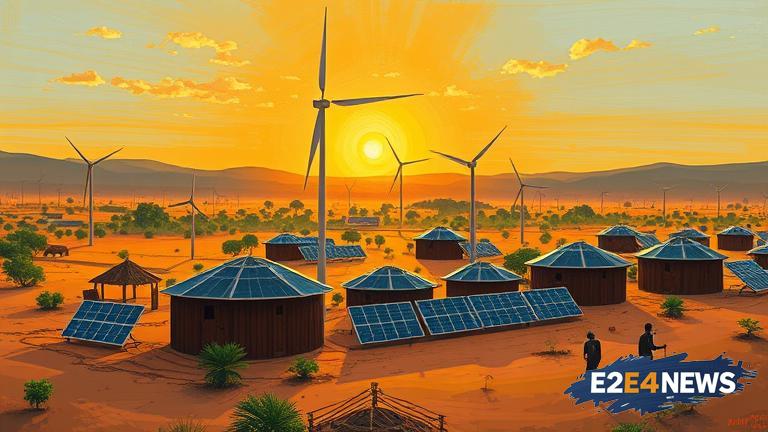The African continent is witnessing a significant shift towards renewable energy, driven by the need to address the pressing issues of energy access, energy security, and climate change. With many countries still struggling to provide reliable and affordable electricity to their citizens, renewable energy has emerged as a viable solution. Solar and wind power are becoming increasingly popular, with many African nations investing heavily in these technologies. In South Africa, for example, the government has set ambitious targets to increase the share of renewable energy in the national energy mix. Similarly, in Morocco, the kingdom has launched several large-scale solar and wind projects to reduce its dependence on fossil fuels. The use of renewable energy is not only helping to reduce greenhouse gas emissions but also creating new job opportunities and stimulating local economies. In Kenya, the Lake Turkana Wind Power project has become one of the largest wind farms in Africa, generating enough electricity to power over 300,000 homes. The project has also created over 2,000 jobs during its construction phase and is expected to contribute significantly to the country’s GDP. Other African countries, such as Egypt and Ghana, are also making significant strides in the development of renewable energy. In Egypt, the government has announced plans to generate 20% of its electricity from renewable sources by 2022, while in Ghana, the country is aiming to increase its renewable energy capacity to 10% of the national energy mix by 2030. The growth of renewable energy in Africa is also being driven by the increasing cost competitiveness of solar and wind power. The cost of renewable energy technologies has fallen dramatically in recent years, making them more competitive with fossil fuels. This has led to a surge in investment in the sector, with many international companies and investors looking to tap into the vast potential of Africa’s renewable energy market. However, despite the many successes, there are still significant challenges to be overcome. One of the major hurdles is the lack of infrastructure, including transmission lines and distribution networks, to support the integration of renewable energy into the grid. Additionally, many African countries still lack the necessary policies and regulatory frameworks to support the development of renewable energy. To address these challenges, many African governments are working to create an enabling environment for the growth of renewable energy. This includes the development of new policies and regulations, as well as investments in infrastructure and capacity building. The African Union has also launched several initiatives to support the development of renewable energy, including the African Renewable Energy Initiative, which aims to achieve at least 300 GW of renewable energy capacity by 2030. The international community is also playing a crucial role in supporting the growth of renewable energy in Africa. Many development agencies and international organizations are providing financial and technical assistance to African countries to help them develop their renewable energy sectors. For example, the African Development Bank has launched a $500 million fund to support the development of renewable energy in Africa, while the World Bank has committed to providing $16 billion in financing for renewable energy projects in Africa over the next five years. Overall, the future of renewable energy in Africa looks bright, with many countries making significant strides in the development of solar, wind, and other forms of renewable energy. As the continent continues to grow and develop, it is likely that renewable energy will play an increasingly important role in meeting the energy needs of African countries and reducing their dependence on fossil fuels. With the right policies and investments in place, Africa has the potential to become a leader in the global renewable energy market, creating new opportunities for economic growth, job creation, and sustainable development. The growth of renewable energy in Africa is also expected to have a positive impact on the environment, reducing greenhouse gas emissions and helping to mitigate the impacts of climate change. As the world continues to transition towards a low-carbon economy, Africa is well-positioned to play a key role in this transition, leveraging its vast renewable energy resources to drive sustainable development and reduce its dependence on fossil fuels.
